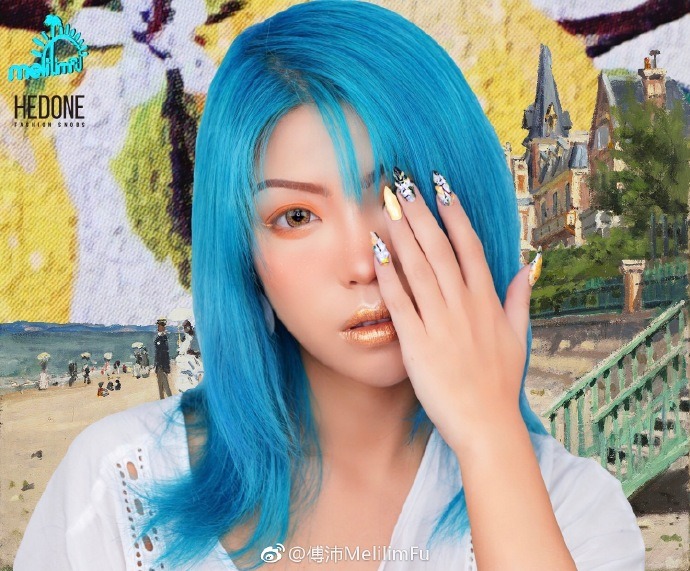
Photo credit: Hannah Morgan.
On a tree-lined street in Shanghai, a glass storefront shows off frilled dresses and high heels. It looks like a typical clothing store, except that it belongs to online fashion sensation LinForeverGirl, who has over four million followers on Weibo, China’s Twitter equivalent.
Now, she’s funneling those fans into foot traffic – and turning them into customers of her own clothing brand.
“[Key opinion leaders, or KOLs,] understand what people want. They understand what they’ll buy,” says Elijah Whaley, chief marketing officer of Parklu, which helps brands find and collaborate with social media influencers in China.
“All they have to do now is create the products, and in China, it’s particularly easy to get hold of a manufacturer to make something,” he adds.
Internet celebrities, sometimes called KOLs, have been around since the dawn of social media. Unlike traditional celebrities – such as actors, musicians, and athletes – KOLs gain a following through their online content, whether it’s photos of food or videos about gaming.
In China, KOLs have taken off in the past few years because of their rising net worth. Last year, online comedian and celebrity Papi Jiang made headlines when she raised more than US$1 million in VC funding. Other KOLs, such as fashion and beauty bloggers, have been able to monetize their fan base by charging brands advertising fees, or receiving tips and gifts on live streaming platforms.
They’re also starting their own product lines and launching online shops. For instance, Whaley and his girlfriend, Maggie Fu, are creating their own cosmetics brand under Melilim Fu, her online persona and brand. Currently, they’re working on their first product, a cosmetics tool.
“My girlfriend has handled all the manufacturing parts of this,” he says. “It’s very, very easy, especially in China. We have the Taobao stores being built, we already have the model product being built.”

Maggie Fu is a makeup artist who co-runs the Melilim Fu brand with Elijah Whaley. Photo credit: Melilim Fu.
In particular, China’s super-platforms make it easy for bloggers, video makers, and live streamers to turn content into a business. A number of young social media stars, such as “Chonny,” a skincare and cosmetics KOL with more than two million Weibo followers, have launched their own stores on Taobao.
See: How WeChat helped a 28-year-old make millions through cartoons
“Instagram is pictures, YouTube is videos, Facebook is a stream. There’s no payments, there’s no commerce, there’s no integrated aspect,” he explains. Weibo, on the other hand, combines social media, live streaming, group chats, and ecommerce. Chinese messaging app WeChat, which has 963 million monthly active users, ties together payments, content, and social networking as well.
KOL incubators
Still, it’s no small feat to turn fans into shoppers, especially while keeping existing and new fans happy with quality content.
“You have to stay on top of the trends. In China, next month, maybe all the platforms you’re using right now, they’re gone. They’re not trendy anymore,” says Brian O’Shea, an Argentinian foodie whose video series “Tastebuds” has become popular in China.
That’s why a number of companies have emerged as KOL incubators, with the express goal of helping internet celebrities sell their own products. Alibaba-backed Ruhan, for instance, helps social media influencers with social media marketing, manufacturing clothes, setting up Taobao stores, and more.
In fact, for most of the year, Ruhan and its bloggers prepare for Singles Day, China’s largest shopping holiday, in November. The profit from a KOL’s online shop is split between the incubator and the social media influencer. Ruhan’s roster of KOLs includes Zhang Dayi, a fashion blogger whose online store reportedly raked in US$46 million in 2016.
Taobao knows that if they get social media stars, they’ll get sales.
Taobao itself is also reaching out to social media influencers to entice them onto the site. “Alibaba is courting a lot of these KOLs to come onto Taobao to set up shop in exchange for a lot of traffic,” explains Miranda Tan, founder and CEO of Robin8, a marketplace that provides data analytics on KOL engagement metrics and conversion rates.
“They will partner them up with other KOLs, do cross-promotion, and hook them up with brands,” she tells Tech in Asia. Taobao knows that if they get social media stars, they’ll get sales.
Tan says that other ecommerce sites are also seeking out KOLs to boost traffic. More niche platforms, such as fashion app MyMM and Xiaohongshu, which specializes in overseas products, want social media influencers to create content and bring in their fans. They don’t have to be the top internet celebrities either – sometimes more targeted KOLs, such as those in travel, beauty, or food, can have higher conversion rates, she says.
“Even though they don’t have millions of followers, their fans are very, very loyal,” says Tan. “When they recommend something, people actually buy it.”

Superstar fashion KOL, Zhang Dayi. Photo credit: Zhang Dayi’s Weibo.
Superfans
To be sure, most KOLs are not making millions of dollars through their own product lines. However, most won’t have to in order to make a living, argues Whaley.
In fact, more important than having millions of fans is how many “superfans” a KOL has, which he defines as followers who will “buy, share, like, and comment on anything that you do.” If an internet celebrity can cultivate 1,000 superfans that buy US$100 in merchandise a year, it’s possible for them to make a living off social media.
“The economics for KOLs is small in that scale but quite significant when it comes to income and lifestyle,” he says.
Some followers will even sponsor a KOL’s living fees.
O’Shea, who talks to hardcore fans on WeChat and Weibo, says some followers will even sponsor a KOL’s living fees. “A friend of mine has a fan paying rent for him,” he tells Tech in Asia at Chat Conference, an event on WeChat in Shanghai last week. “He sends her the landlord’s contact, and she’s paying rent for him.”
Of course, whether or not KOL brands will be able to rival more traditional companies, such as L’Oreal and Adidas, is another matter. Though social media influencers interact with followers on a daily basis and can create more customized products to suit their fanbase’s tastes, KOL product lines – which depend on an individual’s persona – may not have the longevity of older brands.
“It’s high risk – super high risk,” says Whaley. “The reality of my own Melilim Fu brand is, what if she and I were to break up? I don’t know what would happen. It would be a big problem.”
Converted from Chinese yuan. Rate: US$1 = RMB 6.61.
This post In China, internet celebs are turning into entrepreneurs. Here’s how. appeared first on Tech in Asia.
from Tech in Asia https://www.techinasia.com/china-kol-ecommerce-product-lines
via IFTTT
No comments:
Post a Comment